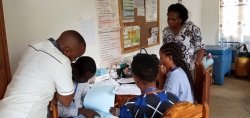
USAID’s Lishe Endelevu (LE) activity is a 4-year agreement that will intensify and integrate nutrition support and improve the nutritional status of women, children and adolescents in 4 regions of Tanzania (Dodoma, Iringa, Morogoro, and Rukwa). By 2022, LE aims for stunting in children under five to decline by 15 percent and the minimal acceptable diet in women of reproductive age and children 6-23 months to increase by 15 percent.
LE project uses different nutrition indicators generated from routine Health Management Information System (HMIS). Information from these specific indicators provides core understanding of the system performance and effect of project interventions. For this purpose, LE project aimed to conduct Data Quality Assessment (DQA) which would inform current status of selected nutrition indicators. The DQA further provide systematic opportunities to strengthen ongoing data collection for nutrition indicators as well as the overall HMIS in Tanzania.
The DQA aimed to identify existing gaps and strengths in the quality of routine nutrition related data being generated in order to inform project activities and to characterize cases that are being missed by the existing data collection system. This assessment had specific aims of developing an effective tool to assess quality of nutrition data, to assess the quality of nutrition data based on the 6 dimensions of data quality and to formulate recommendations for data quality improvement in nutritional services based on findings. The data quality assessment was conducted for a period of 2 weeks in select districts within the program regions.
